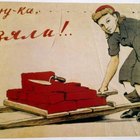More Articles

On the surface, it would seem a household that has two full-time income earners providing financial resources for the family's budget should prosper more than a family with only one income. More money should mean more choices, more free time, and more buying power. Studies completed over the past two decades, however, have discovered exactly the opposite in many cases. Two-income families encounter many more financial and time management obstacles than couples in which only one partner has a full-time career.
Greater Financial Opportunity
A family earning two incomes has a greater amount of financial resources available to it, and therefore should have more disposable income as well. While this idea seems reasonable on the surface, the reality in many two-income homes is exactly the opposite. Two income earners often create a higher fixed-expense baseline for themselves. Two-income families purchase larger homes and tend to own more, and newer, vehicles than do single-income families. Two-income homes also have to purchase child care if they have small children in the home. According to E. Warren, author of "The Two Income Trap," the time stress on two-income-earning families also creates conditions in which parents must spend more on convenience food and ready-made meals, entertainment services, commuting costs, career clothing, and household services, some of which they could handle themselves if one parent were home full time.
Future Financial Security
More money coming into a home can mean a more secure financial future if the partners adopt wise spending practices, and plan. However, in the bubble of two continuous income streams, working adults often find it easier to put off the hard choices of delaying gratification today to save for a future retirement. Those who have one income are often more aware of their limited resources, which leads to making wiser financial decisions with an eye toward tomorrow and planning for a future retirement. However, with proper planning and conservative decision making, two-income homes can prepare for a more financially successful and leisurely retirement.
Who's Raising the Kids
The biggest disadvantage of the two-income home is the stress created between two full-time career parents. The struggle for effective time management usually rolls downhill, and lands in the children's lap. According to the U.S. Department of Health and Human Services, young children learn higher levels of self-esteem and self-confidence when they have both parents available to care for them. They also score better on cognitive development tests when one parent is in the home full time for longer periods before returning to the workplace.
Increased Stress Level
Now referred to in many professional journals as a “role overload,” stress that working parents in dual-income homes feel presses in on them as they struggle to balance career, family, home, and personal lives. Even in a home without children, two income earners have little time to relax and build their relationship after spending 40 to 50 hours of personal energy on the job. Add children to the mix, and for 18 to 20 years, the parents in two-income homes have even less personal time and more responsibilities. Like the proverbial hamster on a wheel, parents juggle home, family, children, relationship, job, social lives and home maintenance tasks, and do not have enough time to connect relationally with each other or their children.
Related Articles

How Does a Parent Going Back to School ...

The Pros and Cons of Moving Out of Your ...

Emotionally Abusive Marriage vs. ...

What Are the Benefits of Cooking With a ...

The Impact of Effective Communication ...

Good Characteristics to Look for in a ...

Why Is Family More Important Than Money?

Differences Between Modern & ...

Husband & Wife Relationships in the ...

What Is the Difference Between Licensed ...

Senior Marriage Problems

How Absent Fathers Affect Men

Problems With Teen Marriage

The Effect of Teenage Pregnancy on the ...

Family Conflict Examples

How to Not Be Jealous Over Stepkids

How to Get Paid for Taking Care of ...

State of Ohio Home Based Child Care ...

The Negative Effects of a Divorce

Description of a Child Care Center
References
Resources
Writer Bio
Since 2003, Timothy Burns' writing has appeared in magazines, management and leadership papers. He has contributed to nationally published books and he leads the Word Weavers of West Michigan writers' group. Burns wrote "Forged in the Fire" in 2004, and has published numerous articles online. As a trained conference speaker, Burns speaks nationally on the art, science and inspiration of freelance writing.
Photo Credits
Comstock Images/Stockbyte/Getty Images